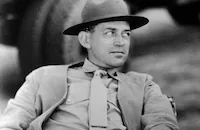The Lady of the Dug-Out
Cast & Crew
W. S. Van Dyke
Al Jennings
Frank Jennings
Corinne Grant
Ben Alexander
Joe Singleton
Film Details

Synopsis
After a prologue in which former outlaws Al and Frank Jennings are introduced by the city editor of a Los Angeles newspaper to an English peer and the editor of a London journal, Al tells the story of their first film The Lady of the Dugout , which he says is a true story. Al and Frank enter a prairie dugout to beg for food, but when they discover that the woman and child who live there have not eaten in several days, they decide to visit a neighboring house to obtain food for them instead. The next day, the brothers send a load of provisions to the woman, whose derelict husband spends all of their money on alcohol. Learning that the woman was swindled by a Texas banker, the outlaws rob the bank and then return to the little sod-roofed house "with the lady's money plus a little interest." Jealous of his wife's new friends, the husband leads a posse to the dugout and gives the order to shoot, even though she and his boy are inside. Frank and Al escape, but discovering later that her husband has been killed, they return to accompany her "back to the old home in Arkansas." Frank and the lady have fallen in love, but because of his status as a fugitive outlaw, he sadly leaves her.

Director

W. S. Van Dyke
Cast
Al Jennings
Frank Jennings
Corinne Grant
Ben Alexander
Joe Singleton
Carl Stockdale

Film Details

Quotes
Trivia
Notes
Although some contemporary sources list the film's title as The Lady of the Dugout, a print of the film reveals that the onscreen title was The Lady of the Dug-Out. The Jennings brothers were members of the outlaw band known as "The Long Riders." They were captured and imprisoned, but later given a pardon by President Theodore Roosevelt. Al then became a lawyer and evangelist and, in collaboration with writer Will Irwin, contributed a series of autobiographical stories to The Saturday Evening Post. The story from which this film was taken was "based on absolute facts" as noted by one reviewer. This was the first film of the Al Jennings Productions Co.












